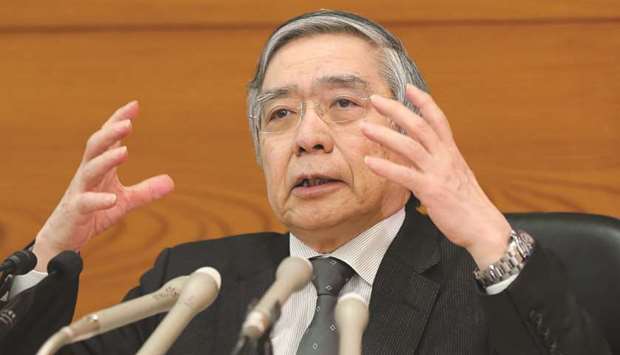Bank of Japan governor Haruhiko Kuroda yesterday ruled out the chance of additional monetary easing, even after heightening overseas risks forced the central bank to temper its optimism that robust exports and factory output will support growth.
Kuroda also brushed aside growing calls from politicians and bank executives to raise interest rates or water down the BoJ’s 2% inflation target to ease the strain of prolonged ultra-low rates on financial institutions’ profits.
“I don’t see the need to change the target, or believe that doing so would be desirable,” Kuroda told reporters after the BoJ’s widely expected decision to keep monetary policy unchanged.
At the two-day rate review that ended yesterday, the BoJ maintained a pledge to guide short-term rates at minus 0.1% and 10-year government bond yields around 0%.
It also said it would continue to buy Japanese government bonds.
Factories across the globe slammed on the brakes last month as demand was hit by the US-China trade war and slowing global growth.
In a nod to the increased risks, the BoJ cut its assessment on overseas economies to say they are showing signs of slowdown.
It also revised down its view on exports and output.
“The sharp deterioration in exports and industrial production should be a serious source of concern for the BoJ,” said Masayuki Kichikawa, chief macro strategist at Sumitomo Mitsui Asset Management.
Kuroda acknowledged the challenges the economy faced but gave no indication there would be any additional stimulus.
“It is true Japan’s exports and output are being affected by slowing overseas growth,” Kuroda said. “On the other hand, domestic demand continues to grow.
As such, we maintain our baseline view that the economy is expanding moderately.” He said while it would likely take longer to achieve the BoJ’s price target, most board members thought it most appropriate to “patiently maintain” current stimulus given some improvement in the output gap.
The BoJ faces a dilemma.
Years of heavy money printing for asset purchases have dried up market liquidity and hurt commercial banks’ profits, stoking concern over the rising risks of prolonged easing.
And yet, subdued inflation has left the BoJ well behind other major central banks in dialling back crisis-mode policies, leaving it with little ammunition to battle the next recession. While Kuroda insists that hitting 2% inflation remains a priority, politicians and economists are increasingly expressing doubts about the target.
Finance Minister Taro Aso told reporters yesterday that “things could go wrong” if the BoJ insisted too much on achieving 2% inflation.
Kuroda said the target was an important tool the BoJ uses to achieve its mandate of price stability.
“Inflation is affected by oil price moves and various other factors. We also need to understand it would take some time for inflation to pick up in Japan after a long period of low growth and deflation,” Kuroda said, when asked about Aso’s remarks. Many in the BoJ expect Japan’s economy to emerge from the current soft patch in the second half of this year, assuming Beijing’s stimulus plans can revive Chinese demand.
The biggest worry among BoJ policymakers is that weakening exports and output will hurt corporate sentiment, prompting firms to delay capital expenditure and wage hikes.
Kuroda said that while such a risk cannot be ruled out, the chance of a deep economic downturn remains small.
A well-known fiscal hawk, Kuroda also warned against the idea that governments can spend recklessly to pull the economy out of the doldrums.
“I think it is an extreme argument that won’t be accepted widely,” Kuroda said, when asked about a recent widely-debated US concept dubbed Modern Monetary Theory (MMT).
Proponents of MMT argue that government spending, and deficits as needed, should be used to meet full employment.
Taxes may not be needed to support all spending since the government can create more money and inflation is the main restraint on government spending, according to the theory.
“Japan’s public debt is very high. It’s important to improve Japan’s fiscal health in the long term,” Kuroda said.

Bank of Japan governor Haruhiko Kuroda speaks during a press conference at the BoJ headquarters in Tokyo yesterday. The BoJ issued a more downbeat assessment of the world’s third biggest economy, as a broader global slowdown impacts exports and production.
